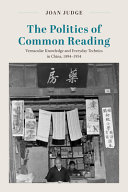The Politics of Common Reading
Google Books
Vernacular Knowledge and Everyday Technics in China, 1894-1954
Joan Judge
Sinossi
Examines the transformation of vernacular knowledge during a pivotal period of modern Chinese history, 1894 to 1954.
In The Politics of Common Reading, Joan Judge examines an era of modern Chinese history, ranging from 1894 to 1954, which she terms "the long Republic." During this era, she explains, editors and compilers accommodated the needs of common readers by secularizing and standardizing texts relating to health, technology, and agriculture, including handbooks and recipe collections. Based on detailed research, she argues that these texts were quietly revolutionary in liberating common readers from state structures that sought to transform them while offering them practical knowledge, technical know-how, and tools for self-improvement. Judge examines an understudied corpus of 500 how-to texts alongside government documents, archival materials, newspapers and periodicals, fiction and other media. She brings to life the way these books were published and circulated through a national network, urban and rural bookstalls, and mail order channels. She examines how these collections were compiled, reassembled, and repurposed, and how they experimented with visual strategies to help readers process and memorize new information. She focuses on the kind of vernacular knowledge these publications promulgated across a series of domains--opium addiction, electricity, cholera infection, and horticulture. Finally, she devises composites of individual knowers so that we can better know them: details of the crises they faced, the remedies they tried, and the texts they might have consulted. She ultimately argues that the acts of conciliation these readers engaged in shaped the broader epistemic terrain from which historical change was actualized in China's century of revolution.